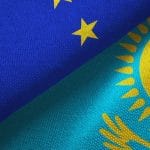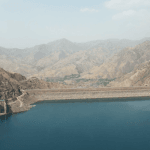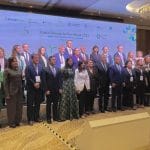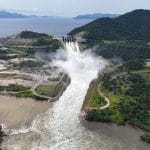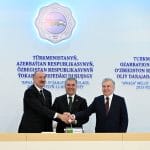Russia’s state atomic corporation Rosatom said on September 20 the first Russian-made fuel bundles with experimental ATF fuel rods (Advanced Technology Fuel) have been loaded into VVER-1000 reactor core at the power unit 2 of the Rostov NPP in southwest Russia, which has resumed operations after the scheduled maintenance and refueling.
“Fuel irradiation in a commercial reactor is an important step for the further commercialization of this product. It is symbolic that this landmark milestone is achieved on the days when TVEL Fuel Company celebrates its 25th anniversary,” TVEL Fuel Company President Natalia Nikipelova said. “We express our gratitude to Rosenergoatom and Rostov NPP for the efficient interaction with Rostekhnadzor and, for our part, we will continue our close cooperation with the regulator for licensing of the further irradiation cycles. ATF development is the major global trend in nuclear power industry, which is aimed at bringing the safety of nuclear power plants to the new level, practically eliminating the probability of accidents with negative impact for the environment,” he added.
Nikipelova noted that some ATF options with alternative fuel matrix could also make operations more economically efficient without increasing the level of uranium enrichment. “According to international analysts, this product will dominate the global market in a relatively short term,” she said.
According to Rosatom, each of the three combined VVER-1000 fuel assemblies of the TVS-2M model contains twelve experimental fuel rods: six of them have their cladding made of chromium-nickel alloy, and the other six have a standard zirconium alloy cladding with chromium coating. These technological solutions enable to either completely eliminate or significantly slow down the zirconium-steam reaction in the reactor core in case of an accident in the reactor core.
Prior the start of the pilot ATF irradiation, the join team of specialists from the Fuel, Machine-building and Power divisions coordinated by Rosatom State Corporation, carried out a large-scale work for validation of loading of the innovative fuel bundles into a commercial reactor, in order to comply with the appropriate license from the Federal Service for Environmental, Technological and Nuclear Supervision Rostekhnadzor, Rosatom said.
For irradiation in a high-capacity reactor, the project team chose the conservative versions of the developed ATF fuel rods with a standard fuel matrix of uranium dioxide. It corresponds with the global practice, as the existing ATF development programs worldwide also suggest that introduction of the new fissile and structural materials should be carried out gradually.
Since 2018, Rosatom has been testing Russian-designed ATF for VVER and PWR reactors. The experimental assemblies, which have passed two full irradiation cycles in the MIR research reactor, contain fuel rods with four different combinations of cladding and fuel matrix materials: in addition to uranium dioxide, uranium-molybdenum alloy with high thermal conductivity has been also used for fuel pellets fabrication. Based on the research results, it is planned to choose the optimal combination of structural and fuel materials, taking into account technical and economic performance. After two irradiation cycles, all fuel rod remain hermetically sealed.
Research, design and testing of the accident tolerant fuel in TVEL Fuel Company is provided and coordinated by the Bochvar Institute of Inorganic Materials.



